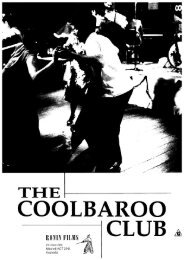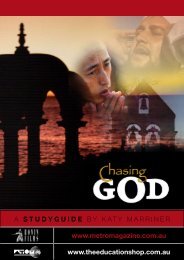to download WHAT I WROTE - MATT CAMERON ... - Ronin Films
to download WHAT I WROTE - MATT CAMERON ... - Ronin Films
to download WHAT I WROTE - MATT CAMERON ... - Ronin Films
Create successful ePaper yourself
Turn your PDF publications into a flip-book with our unique Google optimized e-Paper software.
What I Wrote: Matt Cameron<br />
A STUDY GUIDE BY by KATY MARRINER<br />
Snodger Media and <strong>Ronin</strong> <strong>Films</strong><br />
http://www.theeducationshop.com.au
Introduction<br />
This study guide <strong>to</strong> accompany What I<br />
Wrote: Matt Cameron has been written<br />
for senior secondary students. It provides<br />
information and suggestions for<br />
learning activities in English, Literature,<br />
Theatre Studies and Drama.<br />
What I Wrote: Matt Cameron is a short<br />
film about Australian playwright Matt<br />
Cameron. Dr Tess Brady interviews<br />
Cameron and provides a critical<br />
introduction <strong>to</strong> Tear from a Glass Eye,<br />
Ruby Moon and Hinterland. What I<br />
Wrote: Matt Cameron also includes a<br />
discussion of some of Cameron’s other<br />
plays and an investigation of his<br />
approach <strong>to</strong> writing for the stage.<br />
What I Wrote: Matt Cameron is one<br />
title from a four-part series spotlighting<br />
Australian playwrights. The series<br />
offers students information about the<br />
ideas and processes of the playwrights,<br />
as well as the opportunity <strong>to</strong><br />
hear what the playwrights have <strong>to</strong> say<br />
about their work. Other titles available<br />
in the What I Wrote series include:<br />
• What I Wrote: Louis Nowra<br />
• What I Wrote: Hannie Rayson<br />
• What I Wrote: Katherine Thomson<br />
Further information about the series<br />
can be found at .<br />
Matt Cameron<br />
Matt Cameron is an Australian playwright,<br />
screenwriter and direc<strong>to</strong>r. His<br />
works for the theatre have earned him<br />
the label of postmodern absurdist.<br />
Cameron’s plays include Mr Melancholy,<br />
Footprints on Water, Ruby<br />
Moon, Tear from a Glass Eye and Hinterlands.<br />
In addition <strong>to</strong> his playwrighting<br />
credits, Cameron has run his own<br />
theatre company Neonheart and was<br />
the co-crea<strong>to</strong>r, co-writer and direc<strong>to</strong>r<br />
for the television series Introducing<br />
Gary Pretty. Cameron has also written<br />
scripts for episodes of SeaChange,<br />
CrashBurn and Stingers.<br />
About the filmmakers<br />
Dr Tess Brady – Presenter<br />
Dr Tess Brady is a highly respected<br />
edi<strong>to</strong>r, researcher and teacher of writing<br />
at university level. She was the<br />
co-founding edi<strong>to</strong>r of the international<br />
online scholarly journal TEXT and has<br />
published children’s picture books,<br />
adult radio drama, crime fiction, short<br />
s<strong>to</strong>ries and popular non-fiction. Her<br />
most recent publication is Creative<br />
Writing: Theory beyond practice, with<br />
Nigel Krauth.<br />
Catherine Gough-Brady –<br />
Direc<strong>to</strong>r<br />
Catherine Gough-Brady is a documentary<br />
filmmaker. She has made works<br />
for a variety of media. Gough-Brady<br />
has produced and directed educational<br />
videos and websites. Her ‘docugame’<br />
Docks Dispute is currently used in<br />
tertiary management and industrial<br />
relations courses.<br />
Using What I Wrote: Matt<br />
Cameron in the classroom<br />
Given some of Cameron’s plays are<br />
currently out of print, teachers may<br />
need <strong>to</strong> use excerpts from their personal<br />
copies of the plays <strong>to</strong> generate<br />
discussions and complete questions<br />
and activities.<br />
The writer’s context<br />
‘I do feel like the times affect what you<br />
write.’<br />
– Matt Cameron<br />
‘To me doubt is a really healthy and<br />
necessary part of life.’<br />
– Matt Cameron<br />
‘I find certainty the thing I fear most.’<br />
– Matt Cameron<br />
• Use the internet, critical essays and<br />
commentaries <strong>to</strong> compile a detailed<br />
summary of the contexts that shape<br />
Cameron’s work as a playwright.<br />
Discuss your findings with others in<br />
the class.
• Drawing on one of Cameron’s plays,<br />
determine how Cameron’s attitudes<br />
<strong>to</strong> the world in which he lives have<br />
influenced the construction of the<br />
text. Work in a small group <strong>to</strong> complete<br />
the analysis. Develop a Power-<br />
Point presentation <strong>to</strong> communicate<br />
this information <strong>to</strong> the class.<br />
Views and values<br />
‘We see the ordinary in a new way and<br />
in that way understand it more.’<br />
– Dr Tess Brady<br />
‘We all see the world in different ways<br />
and Matt Cameron is a playwright who<br />
is very interested in this.’<br />
– Dr Tess Brady<br />
• Drawing on What I Wrote: Matt<br />
Cameron and your knowledge of<br />
Cameron’s plays, make a list of the<br />
ideas and issues that Cameron has<br />
brought <strong>to</strong> audiences’ attention.<br />
A significant aspect of Cameron’s<br />
plays is his fascination with the absurd.<br />
As you view What I Wrote: Matt<br />
Cameron compile a list of statements<br />
that explain Cameron’s interest in the<br />
absurd.<br />
• What I Wrote: Matt Cameron claims<br />
that Cameron writes about perception.<br />
Is this true of the play that you<br />
are studying<br />
• Why do you think Cameron uses<br />
comedy as a platform <strong>to</strong> explore<br />
darker aspects of human existence<br />
• Cameron’s characters are often burdened<br />
by fruitless tasks. Make a list<br />
of characters for whom this is the<br />
case. What is Cameron endeavouring<br />
<strong>to</strong> say about human existence<br />
Critical perspectives<br />
• Use the internet, critical commentaries<br />
and reviews <strong>to</strong> arrive at<br />
a detailed knowledge and understanding<br />
of the critical reception of<br />
Cameron’s writing. What viewpoints<br />
do you support What viewpoints<br />
do you refute<br />
The plays<br />
Tear from a Glass Eye<br />
‘Tear from a Glass Eye is a love play<br />
about indifference.’<br />
– Dr Tess Brady<br />
Tear from a Glass Eye is a modern<br />
love s<strong>to</strong>ry. Iris swathed from <strong>to</strong>p <strong>to</strong><br />
<strong>to</strong>e in bandages waits on a beach for<br />
an overhead plane <strong>to</strong> explode and fall<br />
in<strong>to</strong> the sea. Her boyfriend Titus, accused<br />
of causing Iris’ dreadful burns,<br />
should have been on that flight, but<br />
his remains cannot be found in the<br />
wreckage.<br />
• ‘ In Tear from a Glass Eye, Cameron<br />
shows us how identity is part of<br />
loving.’ Do you agree<br />
• In What I Wrote: Matt Cameron,<br />
Cameron explains his attraction <strong>to</strong><br />
the idea of the search for the black<br />
box after a plane crashes and the<br />
answers contained in it. How does<br />
Cameron draw on the idea of a black<br />
box in Tear from a Glass Eye<br />
• ‘An absurdist tale of random fate.’ Is<br />
this an apt description of Tear from a<br />
Glass Eye<br />
• Were you surprised <strong>to</strong> learn that<br />
Cameron’s inspiration for the play<br />
were the lyrics of Radiohead’s Thom<br />
Yorke<br />
Ruby Moon<br />
Sylvie: Was there a child Ray<br />
‘It makes the safe frightening – and if<br />
the safe is frightening, where do we go<br />
<strong>to</strong> hide’<br />
– Dr Tess Brady<br />
In Ruby Moon, Cameron tells a s<strong>to</strong>ry<br />
which we all know and which we all<br />
dread. Innocence wanders off and<br />
meets evil. A little girl in a red dress,<br />
called Ruby Moon wanders down the<br />
street <strong>to</strong> visit her granny. She disappears.<br />
Ruby’s parents are lost in the<br />
nightmare of retracing the events<br />
around her disappearance.<br />
• Why do you think Cameron chose<br />
<strong>to</strong> set Ruby Moon in an ordinary<br />
Australian suburb<br />
• Whose innocence has been lost<br />
Ruby Moon<br />
• is Matt Cameron’s most<br />
popular play. Why do you think this<br />
is so
• ‘ Ruby Moon is a really scary play.<br />
– Dr Tess Brady<br />
What makes Ruby Moon scary<br />
• How does Cameron draw on the<br />
images of the night <strong>to</strong> tell the s<strong>to</strong>ry<br />
• ‘Our constructs imprison us.’ Is this<br />
Cameron’s message<br />
Hinterland<br />
Henry Quealy breaches security and<br />
brings the Cumberson Report <strong>to</strong> the<br />
notice of the Prime Minister. The report<br />
condemns the government and so it<br />
is firmly squashed. Hinterland is a play<br />
about the political. The dark comedy<br />
exposes the state of a nation that commissions<br />
reports only <strong>to</strong> ignore them<br />
and banishes an ordinary man like<br />
Henry <strong>to</strong> a netherworld because of his<br />
opinions.<br />
• ‘I guess I was really interested in that<br />
idea that human beings can be led<br />
for better or worse.’<br />
– Matt Cameron<br />
Cameron acknowledges that Hinterland<br />
was fuelled by anger. His<br />
intention was <strong>to</strong> attack the regressive<br />
sensibilities of Prime Minister<br />
John Howard. Drawing on pertinent<br />
quotations from Hinterland, generate<br />
a discussion of Cameron’s view of<br />
leadership. Use the internet <strong>to</strong> learn<br />
more about the political landscapes<br />
that shaped the play’s narrative and<br />
characters.<br />
• In Hinterland, doors are portals,<br />
openings between physical spaces<br />
but also between ideas. Working as<br />
a class, examine the use of doors as<br />
a s<strong>to</strong>rytelling device.<br />
• ‘I liked the idea of this shrinking<br />
prime minister’<br />
– Matt Cameron<br />
Why do you think Cameron uses<br />
absurdism <strong>to</strong> examine the political<br />
• ‘Doubt is the thing that fuels our<br />
questions and without questions<br />
there could be no investigation.<br />
There could be no discovery of the<br />
new.’<br />
– Dr Tess Brady<br />
Does Hinterland show doubt <strong>to</strong> be a<br />
positive thing<br />
• Were you surprised by Cameron’s<br />
claim that he would like <strong>to</strong> revise the<br />
play<br />
Mr Melancholy<br />
Mr Melancholy is a comic parable<br />
about a hermit, living with two other<br />
hermits, in a lighthouse without a light.<br />
The trio engage in senseless routines:<br />
Ollie, the lighthouse keeper, is stealing<br />
the beach bucket by bucket; Enzo, the<br />
caretaker, is growing a milk moustache<br />
and talking <strong>to</strong> a ventriloquist's dummy<br />
and Margot is interested in marrying<br />
death-prone fish and watching dust<br />
settle. When Dolores, a circus clown<br />
who only wants <strong>to</strong> be serious, washes<br />
up on<strong>to</strong> the beach – life begins <strong>to</strong><br />
change.<br />
Mr Melancholy marked the beginning<br />
of Cameron’s public career as a<br />
playwright. The reviews of Mr Melancholy<br />
acknowledged it as an absurdist<br />
play that was clearly influenced by the<br />
theatre of Samuel Beckett. Cameron<br />
acknowledges that such evaluations<br />
came as a surprise.<br />
• ‘ Mr Melancholy is a play about<br />
change.’ Do you think Dolores is the<br />
agent of this change<br />
• ‘Matt calls it an absurdist parable of<br />
sorrow and solitude.’<br />
– Dr Tess Brady<br />
What moments and statements in<br />
Mr Melancholy endorse this claim<br />
Footprints on Water<br />
‘A tale of god and sex and faith and<br />
floods and desire.’<br />
Noel is a religious zealot. He is building<br />
an ark, so that when God destroys his<br />
morally corrupt village, Noel as selfappointed<br />
chosen one will start the<br />
world again. When the flood comes,<br />
Noel finds himself trapped by his faith.<br />
His beliefs become his downfall.<br />
• ‘God is in the brothel. Sex is in the<br />
church.’<br />
What does Cameron want us <strong>to</strong><br />
think<br />
• ‘Noel’s sense of superiority is his<br />
downfall.’ Do you agree<br />
The writing process<br />
• ‘Classic absurdist plays seem unremittingly<br />
bleak <strong>to</strong> me.’<br />
– Matt Cameron<br />
Absurdism originated as the Theatre<br />
of the Absurd, a movement in both<br />
Europe and the USA in the 1950s<br />
and the very early 1960s. Absurdism<br />
reflects the absurd nature of human<br />
existence and is characterized by<br />
s<strong>to</strong>ries of loss and despair. Cameron<br />
argues that his plays modify and<br />
adapt absurdism <strong>to</strong> provide a reflection<br />
of his contemporary world.<br />
Were you surprised by Cameron’s<br />
admission that he knew very little of<br />
the classic absurdists<br />
Use print and electronic texts <strong>to</strong> find<br />
out more about absurdism. Create<br />
an A4 collage of words and images<br />
that offers your understanding of<br />
absurdism. Use the collages <strong>to</strong> wallpaper<br />
the classroom.<br />
‘It’s always really a painful incremental<br />
process.’<br />
– Matt Cameron<br />
‘The act of seeing the play … on stage<br />
helps me <strong>to</strong> see what still I can do <strong>to</strong><br />
it.’<br />
– Matt Cameron<br />
Cameron is a ‘multiple drafter’. The<br />
first draft is a difficult process and he<br />
reworks a play again and again, even<br />
after it is regarded as ‘finished’ and has<br />
been staged. His plays are constantly<br />
in a state of becoming. He even regards<br />
editing as a thrill. While Cameron<br />
does not use a dramaturge, he does
value the opportunity <strong>to</strong> collaborate<br />
with direc<strong>to</strong>r and ac<strong>to</strong>rs, believing that<br />
their interpretations can help him finetune<br />
the play.<br />
• Cameron is drawn <strong>to</strong> the plays that<br />
explore the ‘power of the emotions’.<br />
He names his influences as Tennessee<br />
Williams, Arthur Miller and David<br />
Mamet. Research the life and writing<br />
of either Williams, Miller or Mamet.<br />
Create an A4 document that offers<br />
an engaging profile of the selected<br />
writer.<br />
• ‘I’m hardly box-office gold’<br />
– Matt Cameron<br />
Do you think this bothers Cameron<br />
• ‘Find like-minded people.’<br />
– Matt Cameron<br />
‘Make theatre.’<br />
– Matt Cameron<br />
Cameron offers his tips <strong>to</strong> success<br />
in What I Wrote: Matt Cameron.<br />
What tip do you think is worth following<br />
Analytic responses<br />
The following <strong>to</strong>pics could be used for<br />
written text responses, debates, panel<br />
discussions and online forums.<br />
• ‘Cameron holds a lens up <strong>to</strong> the ordinary<br />
and shows us how disturbing,<br />
how provocative it can be.’ Discuss.<br />
• ‘Cameron’s plays reveal the fine<br />
line between comedy and tragedy.’<br />
Discuss.<br />
• ‘Cameron uses humour <strong>to</strong> draw us in<br />
<strong>to</strong> his worlds.’ Refer <strong>to</strong> one or more<br />
of Cameron’s plays <strong>to</strong> justify your<br />
interpretation.<br />
From script <strong>to</strong> stage<br />
Create and present a short solo performance<br />
from one of Cameron’s plays.<br />
Submit a short written report that<br />
describes and analyses the processes<br />
used <strong>to</strong> create and present the performance.<br />
This program is available from <strong>Ronin</strong> <strong>Films</strong>.<br />
PO Box 1005 Civic Square ph: +61 2 6248 0851<br />
ACT 2608 Australia fax: +61 2 6249 1640<br />
sue.faulkner@roninfilms.com.au<br />
www.roninfilms.com.au<br />
Printed play scripts are available from Currency Press at .<br />
This study guide was produced by ATOM<br />
© Snodger Media edi<strong>to</strong>r@a<strong>to</strong>m.org.au<br />
For more information on Screen Education magazine, or <strong>to</strong> <strong>download</strong> other free study guides,<br />
visit .<br />
For hundreds of articles on Film as Text, Screen Literacy, Multiliteracy and Media Studies,<br />
visit .<br />
Notice: An educational institution may make copies of all or part of this study guide, provided that it only makes and uses copies as<br />
reasonably required for its own educational, non-commercial, classroom purposes and does not sell or lend such copies.


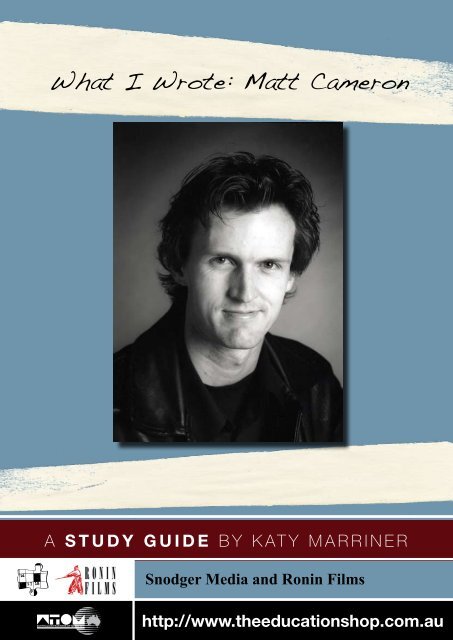
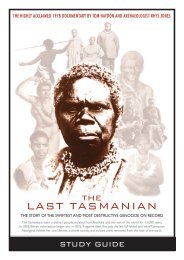
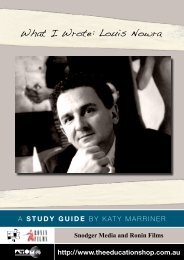
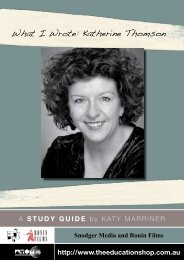
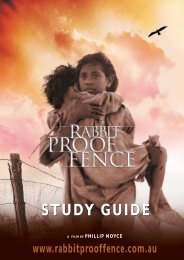

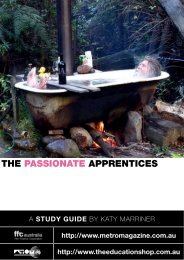
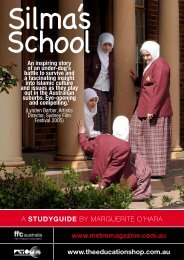
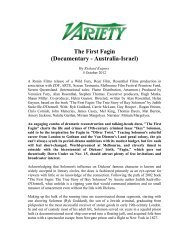
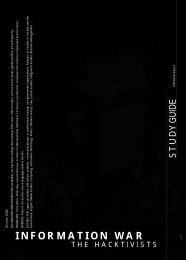
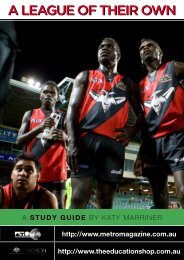
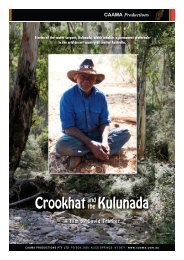
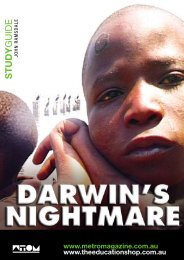
![to download FROHE OSTERN! [HAPPY EASTER!] - Ronin Films](https://img.yumpu.com/33740736/1/184x260/to-download-frohe-ostern-happy-easter-ronin-films.jpg?quality=85)
